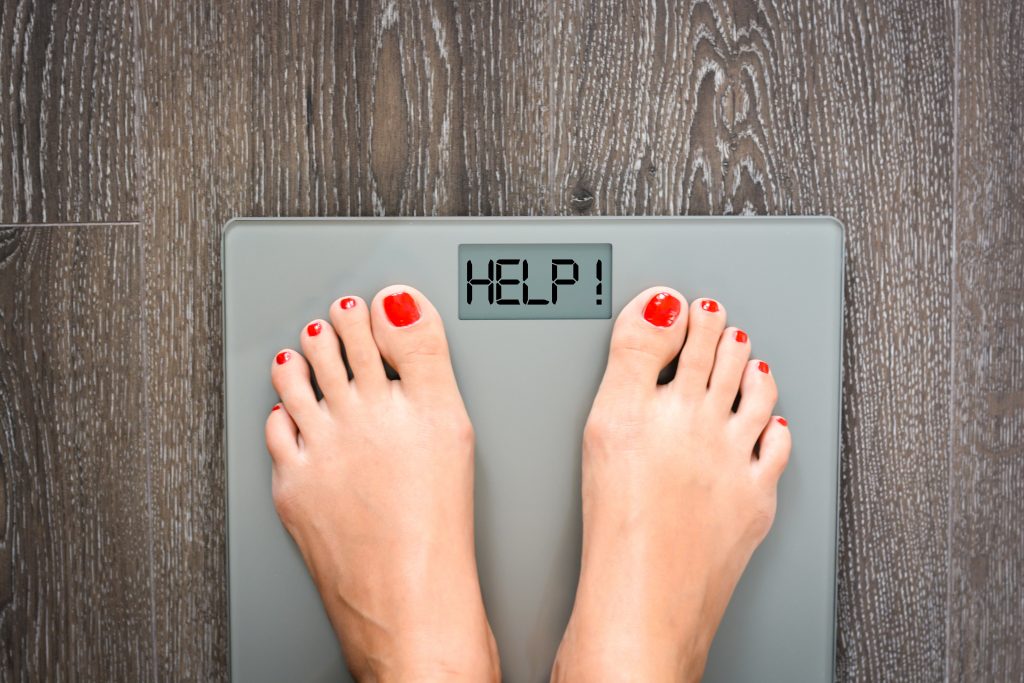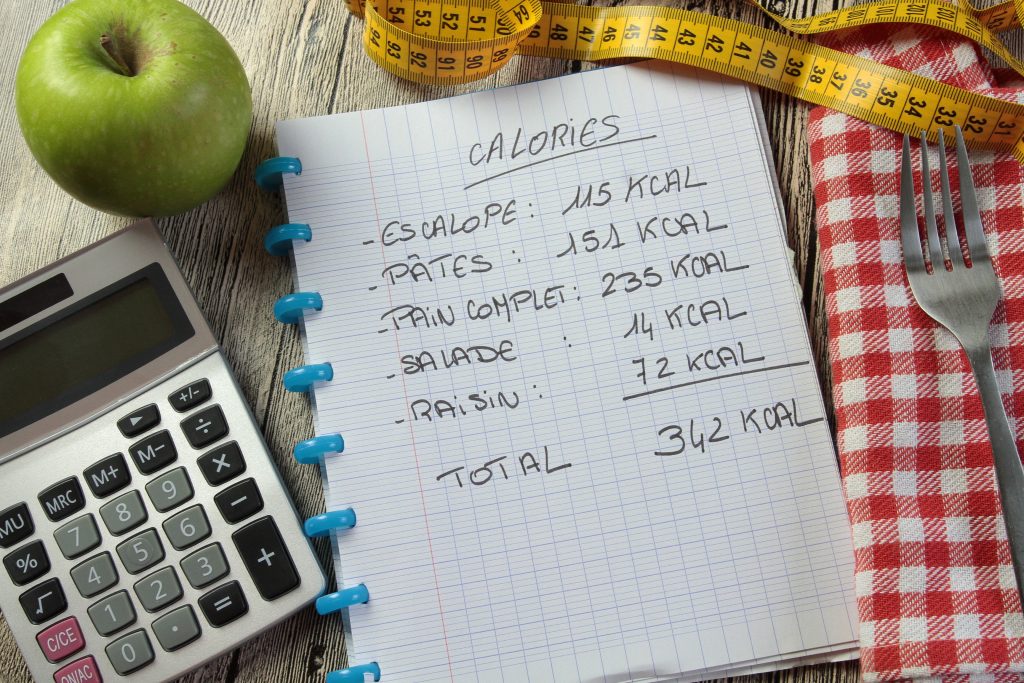This post contains affiliate links. Please see our disclosure policy.

Losing weight can be tricky, but not for the reasons you might think. Weight loss is often reduced to a simple formula. The formula is ‘eat less calories than you burn, count your calories and work harder’ a concept we’ve been force fed by the weight loss industry, and the truth is it doesn’t always work.
This formula can be counterproductive because it forces you to live in a way that isn’t sustainable long-term. Which means you’ll fail to lose weight and keep it off. Eating Clean and slowly making a lifestyle shift that’s enjoyable rewires brain pathways for long-lasting change that makes losing weight and keeping it off more sustainable.
When your body isn’t burning fat, there’s always a reason, so let’s talk about it. If you’ve gained some momentum only to find yourself stuck at a plateau, or if you’ve been pushing yourself hard and can’t seem to get the results you were promised, there are ways to gently encourage your body to keep shedding weight. In this list, we’re also going to bust some myths that thankfully, will make your weight loss journey more pleasurable!

1. Worry Less, Play More
Are you stressed out? One of the most profound truths about the body is that even when it’s “misbehaving” – holding onto weight, being reactive or not doing what you want it to do, it’s trying to protect you in the only way it knows how.
Consider that holding on to extra fat is actually a response to your body perceiving it is in danger in some way… that danger could be stress. Fat is your body trying to protect itself, so the first step in overcoming a weight loss block or plateau is to look at the areas of your life that are causing you stress and then find ways to bring more relaxation, play, and laughter. I can’t tell you how many times I’ve seen someone transform their body with ease when they were feeling really good INSIDE. It makes a difference, so make your happiness and self-care a priority. Spend time with girlfriends, go out and try something new, and PLAY!

2. Quit Counting Calories (Yes, I said it!)
Clean Eating and real foods act differently in your body than processed and sugary foods do. When you Eat Clean, your body recognizes real food and naturally tells you when it’s full. But because processed foods are tasty, yet void of vital nutrition, your body is less likely to signal “full” and more likely to continue saying “I’m still hungry”. This triggers overeating and weight gain. Counting calories is negating the focus which should be placed on quality rather than quantity. Cl
Clean Eating is all about teaching your body how to talk to you without incessant monitoring or strict calorie counting. All calories are not equal, and as Jonathan Bailor, Author of The Calorie Myth shared, “You are not broken. The “eat less, then sleep less so you can exercise more” approach is broken. Go smarter, not harder, and you will transform your life more simply and affordably than you ever thought possible.”
Calorie counting can also be stressful, so when you’re aiming for lower cortisol levels and more joy, try Clean Eating and learning how to listen to your own body. Overtime, you can engrain healthy patterns and have the body you want.

3. Set Bed-time Goals
Check your bedtime for flaws. Are you getting enough sleep? Timing is critical in the case of weight loss. Hormones are triggered at specific times throughout the night to help you shed weight by lowering your cortisol levels and creating hormones responsible for healthy weight, clear skin, and functioning organs.
If you’re awake when your body is trying to regenerate, the entire process will be stalled. Aim for at least 8 hours, and try to be in bed before 11 if possible. Put your phone away too, as research shows blue light from screens can turn off your melatonin production (the sleepy hormone) in the brain keeping you wide awake.
If you find it hard to relax before bed, or experience fatigue and muscle soreness, try a scoop of magnesium in warm water before you go to sleep. Lower your lighting after 9pm so your brain can naturally begin to prepare for sleep and try stretching or reading a novel in bed to help you wind down. Turn your bedroom into a peaceful oasis, keep soft lighting in the room, remove screens, and be sure that your room is at a cooler temperature, as this is optimal for your hormones while you sleep. Your room should ideally be cool enough that you need a blanket to keep warm.

4. Switch Up Your Workouts (or workout less!)
This one depends on you. If you’re working out more (4-7 days a week), you might need to slow down and do less. If you’re hardly exercising at all (1 or 0 days per week), you may need to move more. Look at your chosen form of exercise and determine whether it’s right for your body. Most women are told that HIIT training which consists of very intense and short bursts of exercise with little rest time in between is the sure-fire way to drop weight.
For some people, it really works. But women who are experiencing high-cortisol levels may need to relax more than they need to workout intensely. In the case of weight gain caused by stress, or a weight loss plateau halted by hormones or high cortisol levels, slowing down and Eating Clean is your answer. Try adding yoga into your routine either at home or in a studio, take nature walks, or go swimming and dancing. All of these options are gentle enough while still providing your body the movement it needs to get fit.
Raising endorphins and happy chemicals in the body will trigger stress levels to lower naturally over time. It’s more important that you give your body the signals that it’s safe, so daily movement may need to be more gentle than aggressive to get you results. Tune in to your own body and consider what adjustments may need to be made based on what you’re currently doing.

5. Create an Eating Window
Studies show that weight gain is more common amongst people who eat for longer windows throughout the day and have shorter fasting periods. If you’ve been losing weight and are noticing that you’ve hit a plateau, try creating an eating window which involves “intermittent fasting”. This is different than not eating, skipping scheduled meals or avoiding calories.
Instead, you’re simply choosing a window of the day in which you’ll eat, and a time at which you’ll stop eating for the day after your window closes. For example, you could choose an 8 hour window per day and only eat your meals within that time frame. Intermittent fasting has shown to have great results for participants who want to lose weight but have been stuck.
Keep in mind, this is not for everyone. Your window may need to be longer, like 10-12 hours per day depending on your hormones, your schedule and what you do for work. The big take-away here though is that if you’re eating around the clock, you’re going to lose less weight. A good rule of thumb is to eat a Clean Breakfast, and then stop eating after dinner which ideally you eat at least 3 hours before you go to sleep for the night. Next time you get the midnight munchies, try making yourself a hot herbal tea with lemon and do some stretching instead to shift your state.

6. Feel Your Emotions Instead of Feeding Them
In a sense, emotional eating is quite natural. Food brings us so much pleasure and joy, and we shouldn’t seek to change that. Clean Eating works BECAUSE the food is pleasurable to eat and offers a lifestyle that you can enjoy. However, emotional eating can be damaging when we’re eating things that aren’t serving our bodies while ignoring any underlying emotional pain or discomfort.
Instead of reaching for the cookie jar or bag of chips when you’re feeling distraught, find a healthy way to express your emotions. Maybe it’s through movement (going for a run, doing some yoga in your living room), or maybe it’s talking to your partner or calling a friend. Your emotional health will play a factor in your weight loss journey too, so be kind to yourself.



















